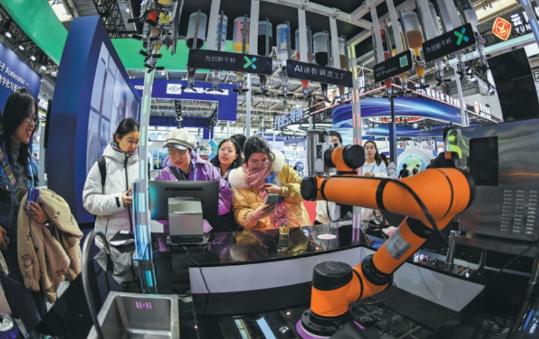Initiatives to bolster supply chains driving foreign trade
China's advanced industrial system and proactive initiatives to bolster global supply chain cooperation will help drive foreign trade while enabling both domestic and foreign companies to expedite their digital and green transformations, business executives said on Wednesday.
Speaking during the ongoing second China International Supply Chain Expo in Beijing, which runs through Saturday, they said that amid sluggish global economic growth and the challenges posed by protectionist measures, reinforcing global supply chain cooperation is practical to reduce business costs, enhance production efficiency and foster shared progress.
Asia Pulp and Paper Co Ltd, or APP, an Indonesian pulp and paper manufacturer, is showcasing its latest products and green technology solutions in the expo's new exhibition area dedicated to advanced manufacturing supply chains this year.
The paper industry is distinguished by its long-supply chain characteristics. As a key player connecting industrial resources between China and Indonesia, APP prioritizes supply chain stability as a fundamental aspect of its development, said Zhai Jingli, deputy CEO of Sinar Mas-APP China, APP's China branch.
"In addition to supplying paper products to the Chinese market, we also ship products manufactured in our plants in China to other countries in the Asia-Pacific region, especially to member economies of the Regional Comprehensive Economic Partnership," said Zhai.
Exports of foreign-invested businesses in China amounted to 5.77 trillion yuan ($796 billion) from January to October, marking year-on-year growth of 1.9 percent, statistics from the General Administration of Customs showed.
Supported by the most comprehensive range of industrial categories and the most complete supporting systems based on the United Nations standards, China's manufacturing industry has maintained its position as the world's largest by scale for 14 consecutive years. The country accounts for over 30 percent of global output, according to information released at the expo by the China Council for the Promotion of International Trade.
With China and many parts of the world entering a new era of green and innovation-led growth, Xiao Song, global executive vice-president of German conglomerate Siemens AG, stressed that building a collaborative and innovative industrial and supply chain is a key pathway for the global manufacturing sector to achieve high-quality growth.
"Backed by the expo's platform and China's opening-up policy measures, we are willing to leverage our digital business ecosystems to help more domestic and global companies empower and optimize their supply chains, bringing together businesses of varying sizes, types and countries into a unified network," said Xiao.
During the expo, Siemens signed service agreements with several Chinese and international partners to further reduce carbon emissions in their operations both in China and overseas.
Syngenta Group, which is based in Basel, Switzerland, and is a second-time expo participant, has brought a number of agricultural produce and farming solutions to the expo this time.
"To effectively align the innovation chain with the industrial chain, technological innovation must be closely tied to industry needs, addressing the requirements of industrial upgrading and the modernization of supply chains," said Su Fu, president of Syngenta Group China.
Through its Agriculture Value Chain program, Syngenta has not only imported a wide range of products such as feed grains, coffee, edible oil and oilseeds into China, but has also taken part in a number of farming projects in countries including Kazakhstan and Ethiopia, boosting agricultural cooperation in countries participating in the Belt and Road Initiative.
Highlighting that agriculture is a vital pillar of global economic development, Jiao Jian, president of Beijing-based Sinochem Holdings Corp, the parent company of Syngenta Group, said that in the face of increasingly frequent extreme weather events and severe climate challenges, a new green revolution is urgently needed in global agriculture. Jiao said that ensuring the stability of global supply chain cooperation is crucial for dealing with these issues.

